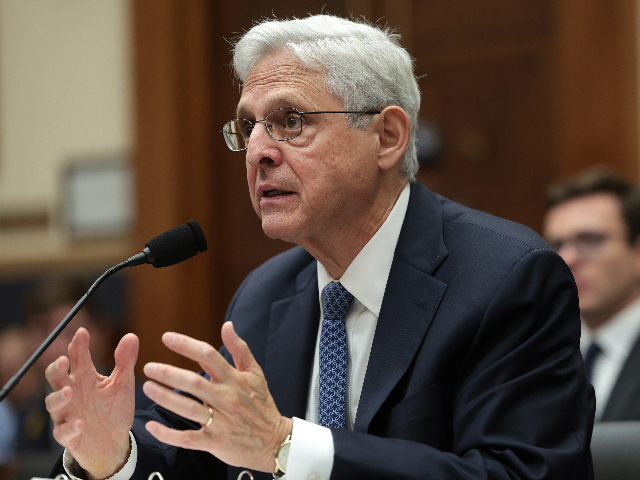Appeals Court to Consider Constitutionality of Jack Smith’s Appointment
Jack Smith’s appointment as special counsel might be in trouble.
The U.S. Court of Appeals for the District of Columbia Circuit advised counsels in Smith’s criminal case against Trump to be prepared during previously scheduled January 9 oral arguments to address issues raised in briefs filed by amicus curiae.
The court made the announcement after an explosive amicus brief filed by attorneys for former Attorney General Ed Meese arguing that Jack Smith’s appointment as special counsel by U.S. Attorney General Merrick Garland is unconstitutional and so the court must reject his prosecution against Trump.
Meese, joined by Steven Calabresi, the co-chairman of the Federalist Society, and Gary Lawson, a prominent constitutional law professor, argues essentially that Garland improperly appointed Smith to an office that does not exist with authority Garland does not possess.
Trump shared a Breitbart News article on the brief, firing off on Smith’s appointment on Truth Social.
“Biden’s Flunky, Deranged Jack Smith, should go to HELL,” Trump wrote, continuing:
He is helping his Corrupt and Incompetent President to destroy America through Weaponization and ELECTION INTERFERENCE! Smith is a Crooked Prosecutor who shouldn’t even be allowed to be in the position he is in — It is Prosecutorial Misconduct. The Great Ed Meese from the Ronald Reagan Era has him figured perfectly!
Smith had sought to expedite his case against Trump for allegedly seeking to overturn the 2020 election in order to convict the former president before the 2024 presidential election takes place. But in a victory for Trump, the U.S. Supreme Court declined Smith’s request for a quick review of Trump’s case for presidential immunity.
The case will now go through the normal process in the appeals court and likely make its way to the Supreme Court from there.
But first, as suggested by the appeals court’s announcement, Smith’s appointment itself might have to survive.
The amicus (or “friend of the court”) brief filed by Meese, Calabresi, and Lawson argues that Smith lacks authority to represent the United States because the office he holds has not been created by Congress and his appointment violates the “Appointments Clause” of the Constitution. They argue that only Congress can create federal offices such as Smith currently holds, which Congress has not done.
The Constitution created the offices of president and vice president while giving Congress the sole authority to create additional offices, making clear those offices must be “established by Law.” While Congress previously passed a law to authorize a similar position called an “independent counsel,” that statute expired in 1999.
The attorneys argue Garland cannot hire a mere employee to perform tasks that Congress has not authorized. Only an “officer” can hold such a significant level of authority. By law, Congress gave the Department of Justice certain powers when creating it, yet it authorized no office with the extensive powers of a U.S. Attorney — a position requiring Senate confirmation — that Garland has given Smith.
They assert that even if special counsels were authorized by Congress — which they have not been since 1999 — anyone in possession of such powers would require presidential nomination and Senate confirmation.

U.S. Attorney General Merrick Garland testifies before the House Judiciary Committee in the Rayburn House Office Building on September 20, 2023, in Washington, DC. (Win McNamee/Getty Images)
The brief continues by arguing that since Smith was given the extraordinary powers generally reserved for a U.S. attorney, he is a “principal officer” under the Constitution’s Appointments Clause, which means he must first be nominated by the president and then confirmed by a majority of the U.S. Senate.
“Not properly clothed in the authority of the federal government, Smith is a modern example of the naked emperor. Illegally appointed, he has no more authority to represent the United States in this Court, or in the underlying prosecution, than Tom Brady, Warren Buffett, or Beyoncé,” they write.
Prior appointed special counsels have been officers of the court confirmed by the Senate. A notable exception is Robert Mueller, who was appointed by Deputy Attorney General Rod Rosenstein in 2017 as special counsel overseeing allegations of Russian interference in the 2016 presidential election despite no longer serving in the federal government.
Under the argument made by Meese’s amicus brief, Mueller’s appointment likely would be unconstitutional as well.
But perhaps most significantly, the appeals court may consider the argument laid out in the Meese amicus brief, which concludes that federal courts should dismiss all of Smith’s prosecutions, including all of Smith’s pending charges against Trump.
Oral arguments will take place on January 9, 2024, at 9:30 a.m. EST.
The case is United States v. Trump, No. 23-3228, in the U.S. Court of Appeals for the District of Columbia Circuit.
Bradley Jaye is a Capitol Hill Correspondent for Breitbart News. Follow him on X/Twitter at @BradleyAJaye.




Comments are closed.